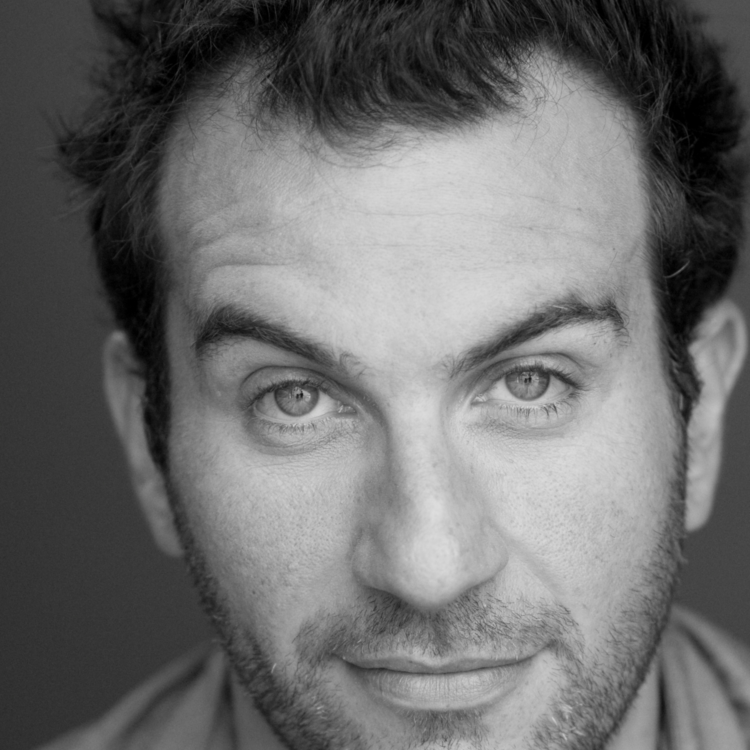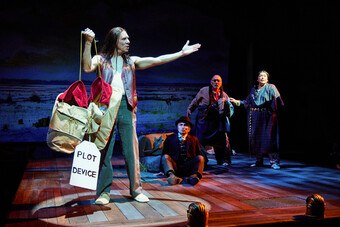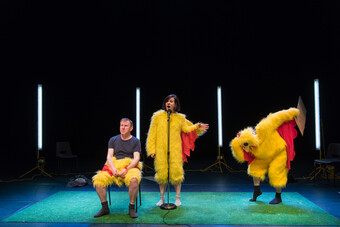A Mets Fan’s Guide To The Theater
When I was a child, my father, a life long actor, would sit back stage listening to The New York Rangers before hurrying off to actually do his job on stage. And when he got off stage, he would sit right back down, put his headphones on, to see if any goals had been scored.
Years later, I walked into rehearsal for my play, The Joke and was greeted by two actors so glum they could barely speak. Why? Tom Glavine, the mercenary, washed-up pitcher for The Mets (he’s a former hockey player too) had just been shelled by the lowly Florida Marlins, a last place team who had geared up on the last game of the year to defeat the Mets, a loss that officially ended the Mets’ season, keeping them out of the playoffs, completing an epic collapse. The actors were Met fans. So was I. We were despondent. The director had to coax us all out of our state to actually begin rehearsal. A year later, I—for the first and only time —checked the internet on my phone during a performance. Why? To see if those very same Mets had avoided yet another collapse (no such luck).
Are there any professional athletes out there who almost miss games because they are so caught up in a play?
How should I feel about the fact that, often, my own job of making an illusion on stage seems less important to me than following a game?
Theater may be my life, but I sure care—like my father and a lot of other theater folks I’ve met—a whole lot about sports. Maybe I fixate on sports because it doubles for what I do. Maybe I identify with the players. LeBron James and I both “followed our dreams.” We both work odd hours. And one imagines that actors and athletes are the two most superstitious folks you can find.
But maybe the reason I obsess over sports is because of how very different they are from what I have chosen to do. In sports, there’s the illusion of fairness and opportunity. Not so much with theater—Chekhov isn’t fair. The biz doesn’t always offer opportunities. Whereas in every sporting event the outcome isn’t decided, it’s still up in the air, it’s still up to the players. I’d like that to be true of every play. Maybe Othello will change his mind, maybe the cherry orchard won’t be sold. But he always goes through it, the tree always falls; I know the end.
In sports, there’s the illusion of fairness and opportunity. Not so much with theater—Chekhov isn’t fair.
So maybe the attraction to the athletes’ struggle is that—even in the face of unlikely odds—they don’t accept defeat or failure. They fight. They still play hard because upsets happen; Mike Tyson can get knocked out, hey, you never know. And I watch them because I wish I could fight in the same way. I wish the ball was in the air, that if I just got to the puck quick enough, I would get that gig, open that show, save that Blanche, avoid the pit of existence. Maybe that’s what it is about sports I find compelling.
But the fact is, I don’t have the athlete’s ethos, not entirely. I don’t always fight and scrap. I also chill, procrastinate, gab, snack, complain. I ponder. I nap. Sports gives us the illusion that it’s all right there, it can be turned on at will, it can all go exactly to plan with a parade and champagne and dance and then the trip to Disneyland. It also gives us the illusion that nothing has been decided. And sometimes it’s nice to think that if I could just have a resilient, fortuitous, scrappy mind-set, there would be joy in the theater. But that’s not true. The Yankees will win. I get tired. The show will close. The lights go out. That shit happens.
And that’s the rub about the stage and the dressing room (game on the iPad or not). It’s in opening night, the design meetings, the table read, the first word on the page. At every step of the way I have this irrational, unspoken, unuttered, hope that this time it will all end unimaginably well—that I’ll collaborate to express ineffable truth that moves the audience in unforeseen ways. And then things get started and it’s different. People drop out. Audiences laugh at weird places. I’ve seen my plays blow minds and yes, have even had the good fortune to have artistic “success.” But on some level it can never be like it is in sports, because there is no winning. It’s thrilling to write a play and see it produced but I know partially how it’s all going to go. Every show I’ve ever done has been in some way a disappointment (of which I’m of course terribly proud). And sports, actually, do occasionally produce those crazy perfect, where-were-you-when perfect endings (see 1986, Shea Stadium, Game 6). My life in theater isn’t like that. It’s impossible to have that kind of moment. The theater reliably provides great possibility as well as imperfection. This leads to letdowns. I know this.
And yet, here I go, doing it again. I know there’s no perfect show, no ideal run, that the highs are fleeting, and that plays often fall short in some way. And yet here I am. Back in the box. Hoping, praying, (working?) for the impossible. That’s probably why I love the Mets.











Comments
The article is just the start of the conversation—we want to know what you think about this subject, too! HowlRound is a space for knowledge-sharing, and we welcome spirited, thoughtful, and on-topic dialogue. Find our full comments policy here
It's trite to say it, but winning isn't everything - even in sport. Many sports fans have had the experience of their team winning, but the game being unsatisfying, unentertaining, boring.
When sport is looked at from the audience perspective it becomes very similar to theater. The experience of the game is what really excites true fans - they'd like their team to win, of course. They are devastated when it loses. Both of these strong emotions are part of fandom.
But watching a team play technically brilliantly but safely, uninspiringly has driven fans to boo their own team.
We're not so different - theaters and sports teams - we both only survive by delivering something that our audiences appreciate and will return for again and again. Yes, winning is part of that in sports, but it's the emotional involvement in both spheres that makes theater-going and sport-supporting worthwhile.
PS to cheer you up - perfection is unattainable in sports as well. Winning is such a low standard to set that 50% of teams do so all the time.